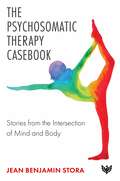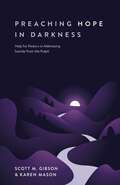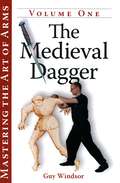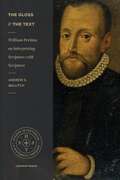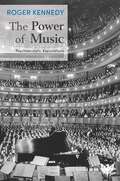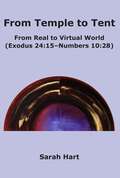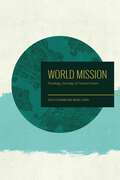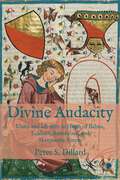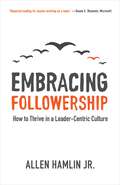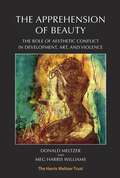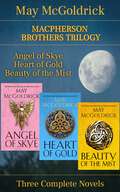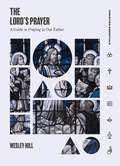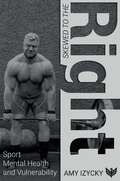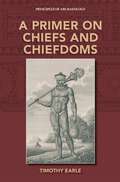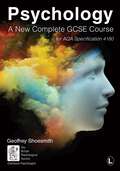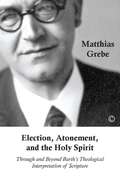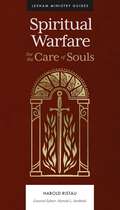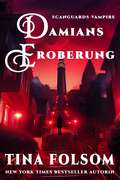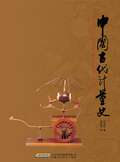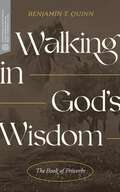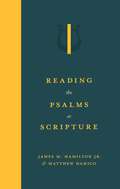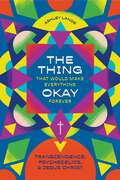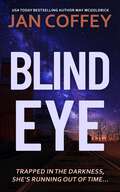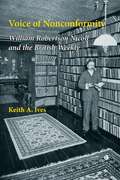- Table View
- List View
The Psychosomatic Therapy Casebook: Stories from the Intersection of Mind and Body
by Jean Benjamin StoraJean Benjamin Stora has worked as a psychoanalyst and psychosomatist for almost five decades. The aim of integrative psychosomatics is to heal the body and mind in relationship to one another rather than treating the body as a machine with parts to be fixed. Thus, Stora explores a patient's current and past life history in relation to physical illness and offers therapeutic support alongside medical treatments. To better understand this revolutionary approach, Stora presents fifteen case studies from the past twenty years. We read of George suffering from hyperlipidemia; Giles, a diabetic facing amputation; Elvira, an alcoholic; Dorothy, who complains the doctors treat body parts but not her; Beatrice facing a reappearance of breast cancer; and ten further patients. This complex process takes into account the fundamental role of the central nervous system in the relationship of mind and body. Thus, neuroscience is a key component of this holistic approach, as well as the new discipline of neuropsychoanalysis. This is most clearly shown in the case of Emma, suffering after brain surgery. The Psychosomatic Therapy Casebook is an excellent introduction to integrative psychosomatics. The stories presented in the first four chapters can be read by anyone with an interest in the subject. The fifth and final chapter is aimed at psychotherapists, psychoanalysts, and doctors looking to gain a greater understanding of the practice. It contains a comprehensive review of the technical points involved and clearly shows the difference between psychoanalytic technique and the technique of psychosomatic therapy. This is an important book in learning to treat the person as a whole rather than split into mind and body.
Preaching Hope in Darkness: Help for Pastors in Addressing Suicide from the Pulpit
by Scott M. Gibson Karen E. MasonHow can a preacher best address suicide from the pulpit? Pastors face many challenges. Suicide in a congregation is amongst the most heart-rending and intimidating. However, the preacher has a unique capacity to engender gospel hope for preparing the congregation and comforting the bereaved. To do so, preachers need help understanding the challenges and opportunities presented by addressing suicide from the pulpit. In Preaching Hope in Darkness, two practitioners in fields that do not typically interact--homiletics (Scott M. Gibson) and psychology (Karen Mason)--work together to support the preacher in this difficult task. Gibson and Mason offer wise advice on a range of topics such as suicide prevention, post-crisis care, and funeral sermon preparation. With an appendix of sample sermons and a sample funeral liturgy, Preaching Hope in Darkness is an essential go-to guide for this difficult topic.
Mastering the Art of Arms Vol 1: The Medieval Dagger
by Guy WindsorIn Mastering the Art of Arms, Volume One: The Medieval Dagger, renowned instructor, author and researcher, Guy Windsor, presents a complete guide to the principles and practice of Italian dagger combat.
The Gloss and the Text: William Perkins on Interpreting Scripture with Scripture (Studies in Historical and Systematic Theology)
by Andrew S. BallitchScripture opens itself up by its own words and interpretation. William Perkins is the father of Puritanism, often remembered for his preaching manual, The Art of Prophecy. Much attention has been given to the Puritan movement, especially in its later forms, but comparatively little has been given to Perkins. In The Gloss and the Text, Andrew Ballitch provides a thorough examination of the hermeneutical principles that governed Perkins's approach to biblical interpretation. Perkins taught that the Bible was God's word as well as the interpretation of God's word. Interpretation is no private matter; it is a public gift of the Spirit of God for the people of God. Ballitch's study sheds light on Perkins as a preacher, theologian, and student of Scripture.
The Power of Music: Psychoanalytic Explorations
by Roger KennedyEmotion is an integral aspect of musical experience; music has the power to take us on an emotional and intellectual journey, transforming the listener along the way. The aim of this book is to examine the nature of this journey, using a variety of perspectives. No one discipline can do justice to music's complexity if one is to have a sense of the whole musical experience, even if one has to break up the whole experience into various elements for the purposes of clarification. The issues raised have some relationship to psychoanalytic understanding and listening, as after all psychoanalysis is a listening discipline; its bedrock is listening to the patient's communications. While of course there are significant differences between understanding of, and listening to, a musical performance and a patient in a consulting room, the book explores common ground. Evidence from neuroscience indicates that music acts on a number of different brain sites, and that the brain is likely to be hard-wired for musical perception and appreciation, and this offers some kind of neurological substrate for musical experiences, or a parallel mode of explanation for music's multiple effects on individuals and groups. After various excursions into early mother/baby experiences, evolutionary speculations, and neuroscientific findings, the book's main emphasis is that it is the intensity of the artistic vision which is responsible for music's power. That intense vision invites the viewer or the listener into the orbit of the work, engaging us to respond to the particular vision in an essentially intersubjective relationship between the work and the observer or listener. This is the area of what we might call the human soul. Music can be described as having soul when it hits the emotional core of the listener. And, of course, there is 'soul music', whose basic rhythms reach deep into the body to create a powerful feeling of aliveness. One can truly say that music of all the arts is most able to give shape to the elusive human subject or soul.
From Temple to Tent: From Real to Virtual World (Exodus 24:15 - Numbers 10:28)
by Sarah L. HartThe principal interest of the text on the tabernacle tent, Exodus 24:15 - Numbers 10:28, is Israelite worship-cultic place, the cultic people, and laws for the regulation of cultic life. The method followed is description of the biblical text and collation of the evidence as would a classicist go about classifying an ancient Greek Vase. The findings reveal a virtual world of Israelite cult. The transportable tabernacle tent with its courtyard and altar resembles a temple in its complexity. Through words the reader is invited into the atmosphere of the tabernacle tent where all the senses are evoked. The beautifully embellished fore-room of the tent illuminated by the light of the lamp-stand is seen, the waft of incense smelt, the atmosphere of fear or attraction that emanates from the epicentre of holiness felt. The tabernacle tent is constructed of words, not of stones. It is indestructible and does not succumb to the vagaries of time, as pristine today as it was over 2,500 years ago when it was first created.
Reflecting on Therapy
by Michael JacobsMichael Jacobs is the author of key texts, such as Psychodynamic Counselling in Action and The Presenting Past. Looking back over fifty years' experience as a therapist and reflecting on some forty years as a supervisor and teacher, he invites you to join him and reflect upon issues uncovered in the therapy room. Therapists are encouraged to engage in reflective practice, thinking through what they are saying and doing, together with presenting their work in supervision in order to engage in fine-tuning their insight and skills. However, it is hard to find the time with so many demands pressing in. Michael presents various situations, phrases and practices which may evade reflection since they are so common in the consulting room, or which may challenge assumptions that easily become habitual in a therapist's practice. He unpacks apparent conventional phrases, such as 'How are you?', 'Did you see ...?', 'And ...'. He says the unsayable, looks at the place of CPD, questions 'expertise', the impact of failure, Freud's cigars, expectations on the therapist, being a therapist, the value of apologies, letting be, niggles, the vicissitudes of memory, the pointlessness of questions, what therapists miss, hopes, goals, taboos, finishing therapy, money, notes ... and many, many more significant possibilities that arise in the course of a week's regular sessions. This beautiful little book contains space within for your own notes, thoughts, and reflections after each reflection from Michael. This gives you the opportunity to ponder, to savour, to develop or disagree on the ideas you encounter. Take your time, slow down, and allow your thoughts to grow.
World Mission: Theology, Strategy, and Current Issues
by Scott N. Callaham Will BrooksWorld missions needs a fully biblical ethos. This is the contention of the editors of and contributors to World Mission, a series of essays aimed at reforming popular approaches to missions. In the first set of essays, contributors develop a biblical theology of world missions from both the Old and New Testaments, arguing that the theology of each must stand in the foreground of missions, not recede into the background. In the second, they unfold the Great Commission in sequence, detailing how it determines the biblical strategy of all mission enterprises. Finally, they treat current issues in world missions from the perspective of the sufficiency of Scripture. Altogether, this book aims to reform missions to be thoroughlyâ€"not just foundationallyâ€"biblical, a needed correction even among the sincerest missionaries.
Divine Audacity: Unity and Identity in Hugh of Balma, Eckhart, Ruusbroec, and Marguerite Porete
by Peter S. DillardIn Divine Audacity, Peter Dillard presents a historically informed and rigorous analysis of the themes of mystical union, volition and virtue that occupied several of the foremost theological minds in the late thirteenth and early fourteenth centuries. In particular, the work of Marguerite Porete raises complex questions in these areas, which are further explored by a trio of her near contemporaries. Their respective meditations are thoroughly analysed and then skilfully brought into dialogue. What emerges from Dillard's synthesis of these voices is a contemporary mystical theology that is rooted in Hugh of Balma's affective approach, sharpened through critical engagement with Meister Eckhart's intellectualism, and strengthened by crucial insights gleaned from the writings of John Ruusbroec. The fresh examination of these thinkers - one of whom paid with her life for her radicalism - will appeal to philosophers and theologians alike, while Dillard's own propositions demand attention from all who concern themselves with the nature of the union between the soul and God.
Embracing Followership: How to Thrive in a Leader-Centric Culture
by Allen HamlinWe live in a leader-centric culture. We're constantly bombarded with advice on how to achieve leadership positions or how to lead well once we get there. We've made leadership out to be the mark of success. But what if leadership isn't our goal? What if we want to do well where we are? Can we use our skills to perform with excellence--as followers? In Embracing Followership, Allen Hamlin Jr. shares from his own experience how you can succeed as a follower without anyone reporting to you. You offer unique contributions to every group you're a part of, and you don't need to be a leader to make a difference.
The Apprehension of Beauty: The Role of Aesthetic Conflict in Development, Art and Violence
by Meg Harris Williams Donald MeltzerThis volume has grown over the years as a family project of Martha Harris, her two daughters Meg and Morag and her husband, Donald Meltzer. It therefore has its roots in English literature and its branches waving wildly about in psychoanalysis. It is earnestly hoped that it will reveal more problems than it will solve.
Macpherson Brothers Trilogy (Macpherson Series)
by Jan Coffey May McGoldrickUSA Today Bestselling Author Passion…Betrayal…Stolen Love! From the wild shores of the Scotland's Western Isles to the bloody fields of France to the glittering courts of Europe, the Macpherson Trilogy follows a family's fight for Scottish independence against the Tudor king, Henry VIII. The Complete Trilogy in One Volume Angel of Skye Heart of Gold Beauty of the Mist
The Lord's Prayer: A Guide to Praying to Our Father (Christian Essentials)
by Wesley HillYou pray it. But do you understand it? The Lord's Prayer has become so familiar to us that we don't think about what we're praying. It's a portrait of Jesus' heart. And in it Christians from different times, places, and traditions have been united. We pray it, but do we actually believe it? When Jesus taught his followers how to pray, he emphasized how uncomplicated it should be. There's no need for pretense or theatrics. Instead, simply ask for what you need as though you were speaking with your earthly father. This opens a window into Jesus' prayer life and presents us with a portrait of his heart for his followers. Wesley Hill re-introduces the Lord's Prayer. He shows us a God who is delighted to hear prayer. Petition by petition, in conversation with the Christian tradition, he draws out the significance of Jesus' words for prayer today.
Skewed to the Right: Sport, Mental Health and Vulnerability
by Amy IzyckyThe demands of the high-performance athlete are huge, with many celebrated for their achievements, and put on a pedestal for admired personality traits such as discipline, sacrifice, commitment, and focus. This book seeks to explore the celebrated traits of the high-performance athlete and, by doing so, to increase awareness of the vulnerability that such traits also present. Through discussion with professional sports people and presentation of their own personal stories the book explores obsessionality, masochism, and focus, and how these characteristics can enhance performance on the field yet hinder life off it and may even develop into clinically diagnosable mental health difficulties. In psychology, assessments are based on statistical phenomena; the title Skewed to the Right is based on the 'bell curve' that is shown through a graph whereby the majority sit in the middle with a few clusters at either on of the extremes. The suggestion is that elite athletes are 'skewed to the right' on a number of key traits that put them between the 'general' population and those with a clinical diagnosis. The book opens with an exploration of weight-restricted sport and how making weight is achieved through practices that become culturally acceptable in the sporting world yet would be seen to be classified as clinically diagnosable eating disorders in the medical world. It then moves on to personality traits that help and hinder - those skewed to the right: masochism, obsessionality, and focus. Part 3 looks at one trait skewed to the left - acceptance - that many sportspeople struggle with. The book closes with a section exploring points of vulnerability for all athletes and ends with a look at where we can go from here. The aim of the book is to increase social awareness of the reality of life for the successful high-performance athlete and the challenging dynamics that exist in sporting culture today. It will be of interest to psychologists, psychotherapists, trainees, and anyone with an interest in sporting culture.
A Primer on Chiefs and Chiefdoms (Principles of Archaeology)
by Timothy EarleChiefs are political operatives who hold titles of leadership over groups larger than intimate kin-based communities. Although they rule with the consent of their group, they are all about building personal power and respect. Many scholars have viewed chiefs as problem solvers--defending groups against aggressors, resolving disputes, providing support under hardship, organizing labor for community projects, and redistributing goods among those in need. Chiefs do these things, but much of what chiefs do is accumulate benefits for themselves, staying in power and legitimizing control. Anthropological archaeology is well suited to pursue the study of chiefs, their leadership institutions (chiefdoms), and long-term historical processes. The author argues that studying chiefdoms is essential to understanding the role of elemental powers in social evolution. As an illustration, he studies chiefs and their power strategies in historically independent prehistoric and traditional societies and discusses how they continue to exist as powerful actors within modern states.
Psychology: A New Complete GCSE Course: for AQA Specification 4180
by Geoffrey ShoesmithThis book provides simple, clear, in-depth explanations of all the topics in the AQA GCSE specification 4180 syllabus but it will prove invaluable to students at many levels on many courses and to the independent reader. It can be used as a stand-alone home study course, as a classroom text, as a reference text or just for pleasure for those who love to think about what makes people tick. Psychology describes up-to-date research as well as some classic psychology studies and even debunks oneor two psychology research myths. It leads the reader through all the topics in the syllabus as a teacher would in a classroom setting. Topics are presented as a series of lessons followed by Check Your Understanding sections, which are designed to help you check and retain the information in each lesson. An assessment record provided at the end of the book will help you keep track of your progress. Lessons are interactive with many opportunities to jot down your thoughts and reactions, reflect on how a topic relates to your own experience, discuss with other people and become more involved with the material presented. Students can pinpoint the topics they are studying for GCSE by using the table mapping the GCSE specification againstthe lessons in this book. For those studying outside formal classrooms there are guidelines about how best to approach your studies. The book assumes that readers have no previous knowledge of psychology and among the topics covered are: - Conformity and Obedience - would you press a button to kill someone just because you are told to do so? Many people would, it seems. - Sex and Gender - do girls and boys, men and women behave so differently? If so, why? - Memory - how does memory work and how accurate is it? - Non-Verbal Communication - do we reveal our true feelings in our body language? - Development of Personality - what exactly is Anti-Social Personality Disorder? - Prejudice and Discrimination - are we bound to discriminateagainst people who are unlike us? - Learning - how to remove your fear of spiders/snakes/flying/open spaces or anything else using the principles of learning. - Aggression - is aggression born into us? Is it in our hormones? Or do we learn to fight? - Research Methods and the Ethics of Psychology - psychology is based on evidence, not just ideas. But what type of study constitutes good evidence and how should we treat the people in our studies?
Election, Atonement, and the Holy Spirit: Through and Beyond Barth's Theological Interpretation of Scripture
by Matthias GrebeElection, Atonement, and the Holy Spirit' is an examination of the doctrines of election and atonement in Karl Barth's 'Church Dogmatics', taking up Barth's own challenge to his reader to surpass his argument and offer a better typological interpretationof the cultic texts. Barth's radical re-working of Calvin's doctrine of election is one of the most important developments in twentieth-century theology. Christ synthesizes for Barth a particular dialectic: the binary structure of God's Yes of election and God's No of rejection. The book's central question - how can Jesus simultaneously be both the elected and the rejected (CD II/2), acting as both the judge and the judged (CD IV/1)? - is followed by an exploration of the roles of the Holy Spirit and human freedom in God's electing and saving action. Although commentators acknowledge Barth's innovation in this area but also identify problems with his approach, few have offered what David Ford has called a correction 'from within' Barth, using Barth's ownmethod. Using the concept of Existenzstellvertretung, this critique of Barth's exegetical justification for the doctrines offers an alternative exegesis that not only provides this much-needed correction, but also immerses the reader in a fresh engagement with Scripture itself.
Spiritual Warfare: For the Care of Souls (Lexham Ministry Guides)
by Harold RistauJesus Christ is the light that no darkness can overcome. Spiritual warfare isn't always obvious. It's normally not scary or spooky; it's usually rather mundane. Yet it's real and always miraculous. In Spiritual Warfare, Harold Ristau shows how faithful spiritual warfare isn't about secret methods and rituals. Rather, for the care of souls, pastors already have all they need in God's word. The Spirit's gifts equip Christians for whatever challenges await them in ministry—even fighting against the wiles of the devil. Spiritual Warfare helps pastors inform, prepare, and equip the saints for the battle. The good fight is fought in prayer and worship. As the church preaches the forgiveness of sins, the darkness is pierced with the light of Christ and those in bondage are freed.
Damians Eroberung: Scanguards Hybriden - Band 2 (Scanguards Vampire)
by Tina FolsomDie Scanguards-Hybriden-Serie wird mit Damian LeSang, dem ältesten Zwillingssohn von Nina & Amaury (Amaurys Hitzköpfige Rebellin), fortgesetzt. Als Vampir-Hybride, der nicht nur Leibwächter bei Scanguards ist, sondern auch den Nachtclub Mezzanine leitet, hat Damian die Auswahl an schönen Frauen. Doch als die kurvige Journalistin Naomi Sutton in das Büro des Nachtclubs einbricht, während sie Behauptungen über angebliche satanische Blutrituale im Club nachgeht, regt sich Damians Blut wie nie zuvor. Doch wie kann er Naomi davon abhalten, seine Geheimnisse aufzudecken, wenn er nichts mehr will, als sie zu Seiner zu machen? Das Verschwinden eines Barkeepers, eine Verwechslung mit seinem Zwillingsbruder und ein Diebstahl werfen weitere Probleme in Damians Leben auf und könnten ihn dazu zwingen, Naomi die Wahrheit über sich zu offenbaren. Doch kann eine Reporterin ein solches Geheimnis bewahren? Lara Adrian, New York Times Bestseller Autorin der Midnight Breed Serie: "Ich bin süchtig nach Tina Folsoms Büchern! Die Scanguards Serie ist eine der heißesten Sachen, die es bei Vampirliebesromanen gibt. Wenn Sie glühend heiße, sich rasant entwickelnde Romane lieben, dann verpassen Sie diese packende Serie nicht!" Über die Serie Die Scanguards Vampirserie ist voll von rasanter Action, brennenden Liebesszenen, witzigen Dialogen und starken Helden und Heldinnen. Vampir Samson Woodford lebt in San Francisco und besitzt die Sicherheits-/Leibwächterfirma Scanguards, die sowohl Vampire als auch Menschen beschäftigt. Und letztendlich auch einige Hexer. Später in der Serie tauchen auch ein paar unsterbliche Hüter und Dämonen auf. Jedes Buch kann als alleinstehender Roman gelesen werden (keine Cliffhanger) und dreht sich immer um ein neues Paar, das die Liebe findet, aber die Serie macht mehr Spaß, wenn sie chronologisch gelesen wird. Scanguards Vampire Band 1 - Samsons Sterbliche Geliebte Band 2 - Amaurys Hitzköpfige Rebellin Band 3 - Gabriels Gefährtin Band 4 - Yvettes Verzauberung Band 5 - Zanes Erlösung Band 6 - Quinns Unendliche Liebe Band 7 – Olivers Versuchung Band 8 – Thomas' Entscheidung Band 8 1/2 – Ewiger Biss Band 9 – Cains Geheimnis Band 10 – Luthers Rückkehr Band11 – Blakes Versprechen Band 11 1/2 – Schicksalhafter Bund Band 12 – Johns Sehnsucht Novelle – Brennender Wunsch Band 13 – Ryders Rhapsodie Band 14 - Damians Eroberung Band 15 - Graysons Herausforderung Band 16 - Isabelles verboten Liebe Band 17 - Coopers Leidenschaft Band 18 - Vanessas Wagemut Band 19 - Patricks Verführung Hüter der Nacht Band 1 – Geliebter Unsichtbarer Band 2 – Entfesselter Bodyguard Band 3 – Vertrauter Hexer Band 4 – Verbotener Beschützer Band 5 – Verlockender Unsterblicher Band 6 – Übersinnlicher Retter Band 7 – Unwiderstehlicher Dämon Codename Stargate Band 1 - Ace – Auf der Flucht Band 2 - Fox – Unter Feinden Band 3 - Yankee – Untergetaucht Band 4 – Tiger – Auf der Lauer Der Clan der Vampire Der Clan der Vampire (Venedig 1 – 2) Der Clan der Vampire (Venedig 3 – 4) Der Clan der Vampire (Venedig 5) Jenseits des Olymps Band 1 – Göttersturm Band 2 - Göttertraum Band 3 - Götterglanz Band 4 – Götterlust Die Scanguards Vampirserie hat alles: Liebe auf den ersten Blick, von Feinden zum Liebespaar, Alpha-Helden, Leibwächter, Brüderschaft, Jungfrau in Not, Frau in Gefahr, die Schöne und das Biest, verborgene Identität, Seelenverwandte, erste Liebe, Jungfrauen, gequälter Held, Altersunterschied, zweite Liebeschance, trauernder Liebhaber, Rückkehr von Totgeglaubten, heimliches Baby, Playboy, Entführungen, von Freunden zum Liebespaar, Coming-out, heimlicher Verehrer, unerwiderte Liebe, Amnesie, Aristokraten, verbotene Liebe, eineiige Zwillinge, Partner bei der Verbrechensbekämpfung.
The History of Ancient Chinese Measures and Weights
by Qiu GuangmingQiu Guangming, the author of this book, is a researcher on the measuring and weighing systems in China for more thirty years. he has been collecting historical data and examining actual objects, which resulted in in numerous research papers and books. This books examines these systems she has researched.
Walking in God's Wisdom: The Book of Proverbs (Transformative Word)
by Benjamin T. QuinnGet wisdom, get insight (Prov 4:5)The book of Proverbs is an invitation to "get wisdom." But wisdom isn't so easily defined or found. Without discernment, we can be swayed by teachers or sayings that sound wise, but true biblical wisdom is rooted in the fear of the Lord. In Walking with God's Wisdom, Benjamin T. Quinn calls us to hear and obey God's wisdom found in Proverbs. These ancient words reveal a way of life exemplified in Jesus Christ. Quinn shows how even the most ordinary aspects of life are packed with importance for wise living before God.
Reading the Psalms as Scripture
by James M. Hamilton Jr. Matthew DamicoThe psalms cultivate a life of prayer grounded in Scripture. In Reading the Psalms as Scripture, James M. Hamilton Jr. and Matthew Damico guide the reader to delight in the spiritual artistry of the psalms. Psalms is a carefully arranged book saturated in Scripture. The psalmists drew from imagery and themes from earlier Scripture, which are then developed by later Scripture and fulfilled in Christ. The book of psalms advances God's grand story of redemption, and it gives us words to pray by drawing us into this story. When we meditate on the promises and patterns in the psalms, we can read, pray, and sing them with faithfulness.
The Thing That Would Make Everything Okay Forever: Transcendence, Psychedelics, and Jesus Christ
by Ashley LandeFor years, psychedelics were my religion. All I ever wanted was The Thing That Would Make Everything Okay Forever, the panacea, the cure for what plagued me. From those first moments when I tasted the earthy pulp of a psilocybin mushroom, it was love. Psychedelics were my sacrament. They shot me into cathedral vaults. The promise of eternal life through chemicals glittered seductively, but hid a yawning abyss. The Thing That Would Make Everything Okay Forever tells my story of psychedelic devastation and spiritual rescue. It chronicles my trajectory from acid enthusiast to soul-weary druggie to psychedelic refugee. I finally found The Thing That Would Make Everything Okay Forever—in the last place I thought to look.
Blind Eye
by Jan Coffey May McGoldrickTRAPPED IN THE DARKNESS, SHE'S RUNNING OUT OF TIME.... Counting down to Chernobyl-scale disaster THE CLOCK STARTS NOW… Tick… Scientist Marion Kagan is the sole survivor after gunmen attack the facility where her team was working on a top-secret project. Wounded and trapped in a collapsed building, Marion must stop radioactive test samples from leaking out and killing millions. …tick… In a Connecticut psychiatric hospital, Marion's twin sister, who has been in a comalike state for years, begins to thrash violently in her bed. When an experimental program is used on her to read the images of her brain, researchers are shocked at what they find. …tick… An American soldier just back from Iraq is searching for direction in his life. While he watches the news about the research facility explosion, he is unaware that fate has just chosen a direction for him—straight into a deadly game of international corporate intrigue.
Voice of Nonconformity: William Robertson Nicoll and The British Weekly
by Keith A IvesA study of William Robertson Nicoll, a non-conformist individual who had considerable influence in the late 19th Century. Originally a minister, he was considered a great leader and was also a theological conservative, and therefore committed to maintaining the orthodox stance of the Christian Churches, but at the same time, he encouraged many of the new ideas, which he felt would prove a useful and hopeful benefit for the Church. Due to health issues he was later forced to retire his position and focused on work as an editor and journalist, bringing with him the same sense of leadership he had previously been known for. The debate over his legacy continues and is addressed within this study using previously unstudied information on Nicoll's life.
